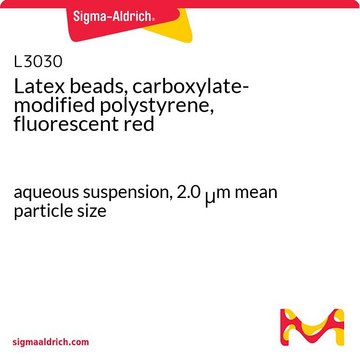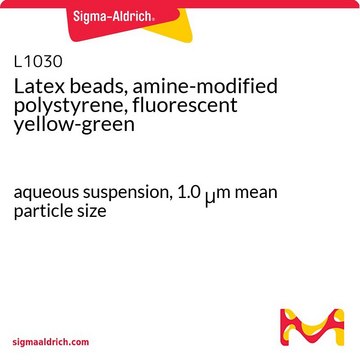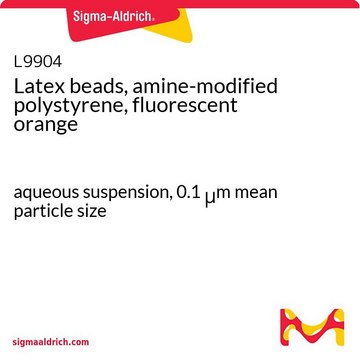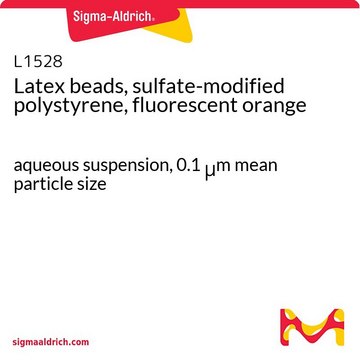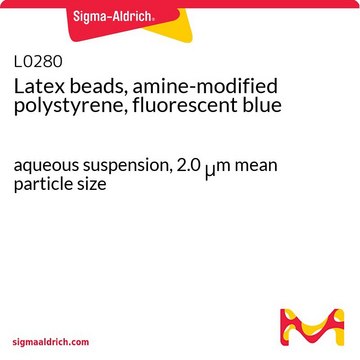L3280
Latex beads, carboxylate-modified polystyrene, fluorescent red
aqueous suspension, 0.5 μm mean particle size
Sinónimos:
Carboxylate Polystyrene Beads, Fluorescent Latex Beads
Iniciar sesiónpara Ver la Fijación de precios por contrato y de la organización
About This Item
Productos recomendados
Formulario
aqueous suspension
Nivel de calidad
composición
Solids, 2.5%
técnicas
cell based assay: suitable
tamaño medio de partícula
0.5 μm
fluorescencia
λex ~575 nm; λem ~610 nm
aplicaciones
cell analysis
¿Está buscando productos similares? Visita Guía de comparación de productos
Aplicación
Carboxylate-modified polystyrene latex beads have been used to collect morphofunctional data about the immune systems of Carabus lefebvrei, a helicophagous Italian endemic ground beetle often used as an indicator of the habitat quality of the Apennines mountain forests. Carboxylate-modified polystyrene latex beads have also been used to inform comparative studies on immunity defense mechanisms of adults and larvae of the coleopteran Cetonischema aeruginosa and to investigate the phagocytic activity of cultured rat thyroid cells.
Latex beads, carboxylate-modified polystyrene, fluorescent red has been used:
- along with Milli-Q for fluid dynamic studies
- along with bile salts for confocal studies
- for particle encapsulation
Código de clase de almacenamiento
10 - Combustible liquids
Clase de riesgo para el agua (WGK)
WGK 3
Punto de inflamabilidad (°F)
Not applicable
Punto de inflamabilidad (°C)
Not applicable
Equipo de protección personal
Eyeshields, Gloves
Elija entre una de las versiones más recientes:
¿Ya tiene este producto?
Encuentre la documentación para los productos que ha comprado recientemente en la Biblioteca de documentos.
Los clientes también vieron
Daeho Choi et al.
Soft matter, 15(23), 4647-4655 (2019-05-11)
Passive droplet generation for an aqueous two-phase system (ATPS) was performed with a fracture-based variable microchannel. A jet of dextran-rich phase (DEX) in a polyethylene-glycol (PEG)-rich phase was created by focused flow. The width of the inlet channel could be
Adam Macierzanka et al.
PloS one, 9(4), e95274-e95274 (2014-04-24)
The final boundary between digested food and the cells that take up nutrients in the small intestine is a protective layer of mucus. In this work, the microstructural organization and permeability of the intestinal mucus have been determined under conditions
Fumihiko Kitagawa et al.
Journal of chromatography. A, 1106(1-2), 36-42 (2006-01-31)
This paper reports a thermal lens microscope (TLM) detection coupled with capillary electrophoresis (CE) by using an interface chip (IFChip) to achieve highly sensitive detection with high reproducibility. Fused silica capillaries with an inner diameter of 50 microm were directly
Kristen M Flatt et al.
Genetics, 211(1), 169-183 (2018-11-10)
Phenotypic plasticity is a critical component of an organism's ability to thrive in a changing environment. The free-living nematode Caenorhabditis elegans adapts to unfavorable environmental conditions by pausing reproductive development and entering a stress-resistant larval stage known as dauer. The
Passive droplet generation in aqueous two-phase systems with a variable-width microchannel
Choi D, et al.
Soft Matter, 15(23), 4647-4655 (2019)
Nuestro equipo de científicos tiene experiencia en todas las áreas de investigación: Ciencias de la vida, Ciencia de los materiales, Síntesis química, Cromatografía, Analítica y muchas otras.
Póngase en contacto con el Servicio técnico
